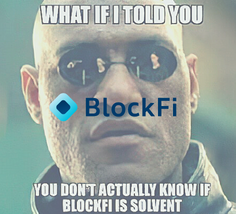BlockFi has filed for Chapter 11 bankruptcy protection and will seek to restructure its business as the cryptocurrency lending company owes more than 100,000 creditors with an estimated liability of between $1 billion and $10 billion.

Initially, BlockFi suspended user withdrawals on November 11 in response to the FTX debacle.
In an announcement on Monday, BlockFi said it had filed for Chapter 11 bankruptcy protection and reorganization under the U.S. bankruptcy code, adding that it would undergo a reorganization. Logically, the company confirmed that its decision to file for bankruptcy followed the "shocking events surrounding FTX", which collapsed in the second week of November. BlockFi Lending LLC also acknowledged their "difficult but necessary decision" to suspend withdrawals on November 11.
BlockFi said it will now focus on collecting bonds, especially those owed by FTX and its related companies. BlockFi has significant exposure to these companies, including Alameda Research securities, FTX deposits, and unused FTX.US credit lines. The New-Jersey based entity added that FTX's ongoing bankruptcy proceedings meant it could experience delays in recovering those funds. Mark Renzi of Berkeley Research Group, which is BlockFi's financial advisor, informed that the company took "immediate action" to protect itself and its customers after the FTX debacle. He added that the company "expects a transparent process that leads to the best possible outcome for all customers and other stakeholders."
BlockFi said it has $256.9 million in cash to support business operations, although user activity remains suspended. The company will continue to pay its employees, but plans to lay off two-thirds of its workforce.
According to Reuters, BlockFi's bankruptcy filing revealed more than 100,000 creditors. The filing also showed that the company has accumulated liabilities between $1 and $10 billion.
BlockFi's bankruptcy filing reveals it owes $275 million to FTX, making FTX the company's second largest creditor. Their biggest creditor is Ankura Trust, a trust company, which owes BlockFi $729 million. The U.S. Securities and Exchange Commission (SEC) is also among BlockFi's creditors, as the company still owes the regulator about $30 million in a February settlement.
BlockFi has been in ongoing business with FTX by borrowing money from cryptocurrency exchange Alameda -which is guilty of being directly related, fraudulently, to FTX- and holding cryptocurrencies on FTX's platform. According to fintechnews.ch citing BlockFi representatives, following the FTX bankruptcy, the management team and board took immediate action to protect customers and the company. Additionally, the company acknowledged that it had considerable exposure to FTX and related legal entities, but denied that a substantial portion of its assets were invested in FTX.

Top 10 Cryptocurrency Losses After BlockFi Bankruptcy
1/ Ethereum (ETH): Another victim of the FTX exchange collapse this month, US cryptocurrency lender BlockFi declared bankruptcy overnight, according to CoinMarketCap. Ether fell 2.2% to $1,169 during Asian trading hours.
2/ Binance USD (BUSD): BlockFi's bankruptcy sent the world's largest cryptocurrency exchange, Binance Global Inc, down 5.2% to $292.91 on CoinMarketCap.
3/ Litecoin (LTC): Litecoin, also feeling the effects of BlockFi's bankruptcy, lost ground recently and was the biggest loser among the top 10 cryptocurrencies, down 4.34% to $74.92. Cryptocurrency experts are constantly analyzing the volatility of Litecoin. They predict that the average LTC price will be around $391.25. By the end of 2027, it could drop to $378.04 but recover to $448.73.
4/ Bitcoin (BTC): Even during the fall of FTX and the recent macro trigger, Bitcoin held the key support at $16,000. Bitcoin's performance wasn't even affected by the further fallout from the FTX crash. The bankruptcy filing and legal action by cryptocurrency lender BlockFi contributed to Bitcoin's downfall, but it was not the cause.
5/ USD Coin (USDC): USD Coin is currently down 0.02% thanks to BlockFi. The real-time market cap is $43,277,343,538 and the current CoinMarketCap ranking is 5,
6/ Uniswap (UNI): UNI's price fell 30% over the next few days to around $25.60 before starting to gradually rise again. However, BlockFi has an influence on this price change.
7/ Ripple (XRP): Although down 14.89%, Ripple (XRP) is up 168.14% with a 24-hour trading volume of $4,168,457,428.
8/ Dai (DAI): Recently down 0.05%. Among the companies backed by Dai, the bankruptcy of BlockFi is said to be the source of the problem.
9/ Solana (SOL): The price of Solana (SOL) is down 0.5% since BlockFi filed for bankruptcy.
10/ Basic Attention Token (BAT): Has been on a downward trend lately, down -26.49% in the last 30 days. The price of the Basic Attention Token has fallen -34.13% over the past three months, indicating a medium-term downward trend. This development was expected given the bankruptcy of BlockFi.
BlockFi was forced to act in ways it previously resisted during the Voyager and Celsius debacles. On November 11, the day FTX declared bankruptcy, BlockFi stopped accepting withdrawals from its customers. Investors in companies such as FTX, Voyager and Celsius do not currently have access to the funds.
Article by H.Zak